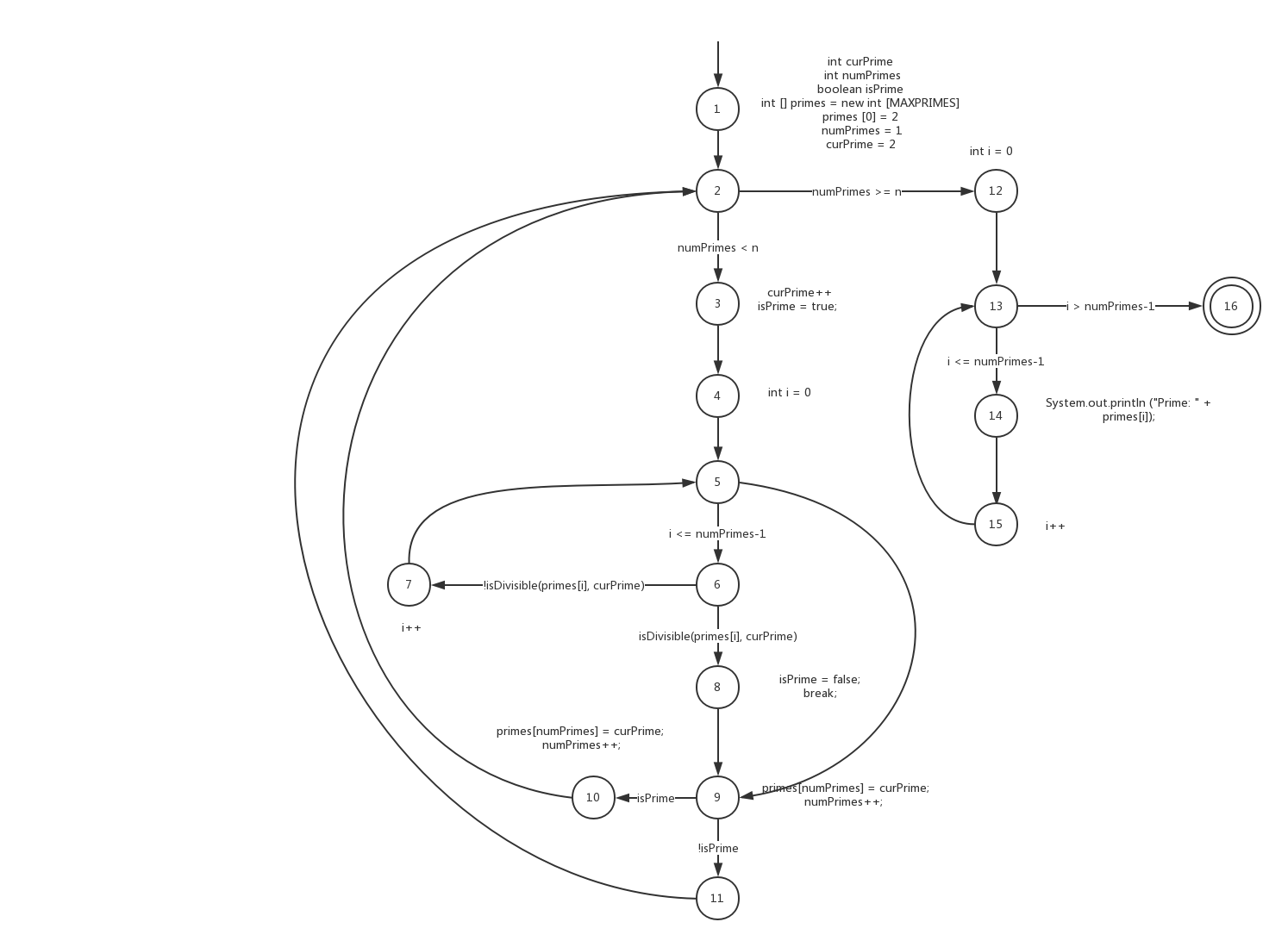软件测试homework 3
1. 基于Junit 及Eclemma (jacoco )实现一个主路径覆盖的测试

package cn.scs.st; public class PrintPrime { public static String printPrimes (int n) { int MAXPRIMES = 10; int curPrime; // Value currently considered for primeness int numPrimes; // Number of primes found so far. boolean isPrime; // Is curPrime prime? int [] primes = new int [MAXPRIMES]; // The list of prime numbers. // Initialize 2 into the list of primes. primes [0] = 2; numPrimes = 1; curPrime = 2; while (numPrimes < n) { curPrime++; // next number to consider ... isPrime = true; for (int i = 0; i <= numPrimes-1; i++) { // for each previous prime. if (curPrime%primes[i]==0) { // Found a divisor, curPrime is not prime. isPrime = false; break; // out of loop through primes. } } if (isPrime) { // save it! primes[numPrimes] = curPrime; numPrimes++; } } // End while // Print all the primes out. String s = null; for (int i = 0; i <= numPrimes-1; i++) { System.out.println ("Prime: " + primes[i]); s += primes[i]; } return s; } // end printPrimes }
全覆盖测试

package cn.scs.test; import static org.junit.Assert.*; import org.junit.Before; import org.junit.Test; import cn.scs.st.PrintPrime; public class test { public PrintPrime prime; @Before public void setUp(){ prime = new PrintPrime(); } @Test public void testCase(){ assertEquals("null235711", prime.printPrimes(5)); } }
测试结果


2. Use the following method printPrimes() for questions a–d.

b. 将MAXPRIMES设为4,这样t2=(n=5)就会出现数组越界的错误,但t1=(n=3)无影响。
c. 当n=1的时候,不满足numPrime < n, 不会执行循环
d.
点覆盖
{ 1,2,3,4,5,6,7,8,9,10,11,12,13,14,15,16}
边覆盖
{(1,2),(2,3),(2,12)(3,4),(4,5),(5,6),(5,9),(6,7),(6,8),(7,5),(8,9),(9,10),(9,11),(10,2),(11,2),(12,13),(13,14),(13,16),(14,15),(15,13)}
主路径覆盖
{(1,2,3,4,5,6,7),
(1,2,3,4,5,9,10),
(1,2,3,4,5,9,11),
(1,2,3,4,5,6,8,9,10),
(1,2,3,4,5,6,8,9,11),
(1,2,12,13,14,15)
(1,2,12,13,16),
(2,3,4,5,6,8,9,10,2),
(2,3,4,5,6,8,9,11,2),
(2,3,4,5,9,10,2),
(2,3,4,5,9,11,2),
(3,4,5,6,8,9,10,2,12,13,14,15),
(3,4,5,6,8,9,11,2,12,13,14,15),
(3,4,5,9,10,2,12,13,14,15),
(3,4,5,9,11,2,12,13,14,15)
(3,4,5,6,8,9,10,2,12,13,16),
(3,4,5,6,8,9,11,2,12,13,16),
(3,4,5,9,10,2,12,13,16),
(3,4,5,9,11,2,12,13,16),
(5,6,7,5),
(6,7,5,9,10,2,12,13,14,15),
(6,7,5,9,11,2,12,13,14,15),
(6,7,5,9,10,2,12,13,16)
(6,7,5,9,11,2,12,13,16)
(13,14,15,13)
(14,15,13,16)}





【推荐】编程新体验,更懂你的AI,立即体验豆包MarsCode编程助手
【推荐】凌霞软件回馈社区,博客园 & 1Panel & Halo 联合会员上线
【推荐】抖音旗下AI助手豆包,你的智能百科全书,全免费不限次数
【推荐】博客园社区专享云产品让利特惠,阿里云新客6.5折上折
【推荐】轻量又高性能的 SSH 工具 IShell:AI 加持,快人一步